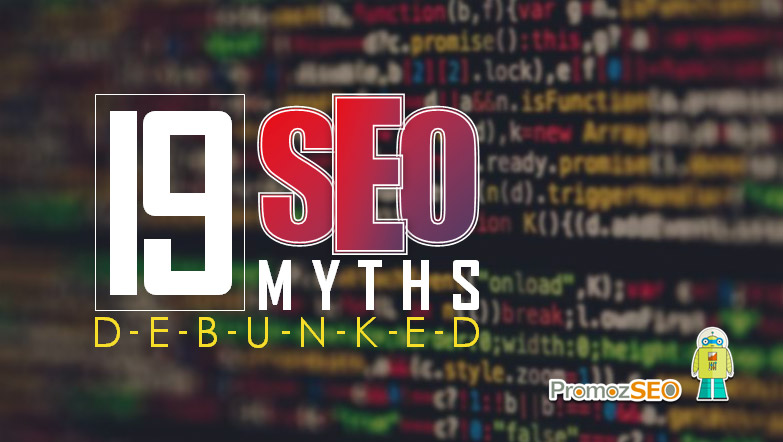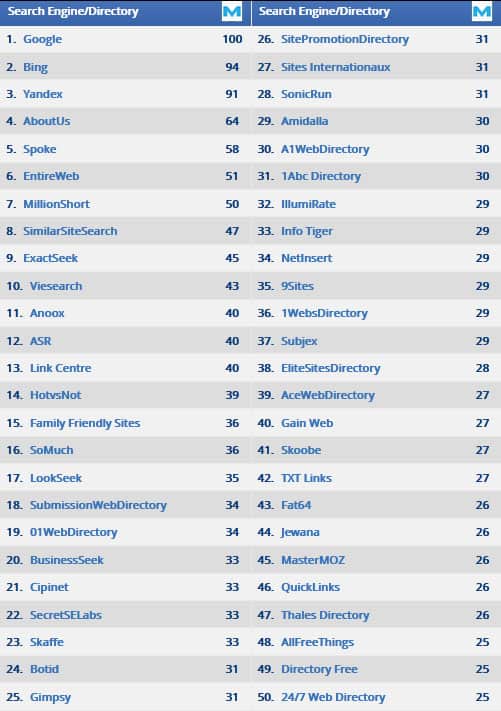19 SEO Myths Your Clients may Tell You, which will Leave You Dazed and Shocked

In general, the origin of myths lies in the figment of our imagination. But when it comes to SEO myths, I believe it’s primarily because of our lack of knowledge and mere assumptions. SEO is an ever-changing process, and much because of its job-diversity, it has given birth to a number of myths that can leave you bedazzled.
But the even more disturbing part of this is that most of them are like zombies. I mean, even after busting them over and over again, they just don’t seem to die!
Reminds you of any movie? Well, I won’t be surprised if it does.
Trust me; all those bizarre SEO statements that you often hear from your clients are myths that are already debunked countless times by experts in innumerable articles on the internet.
Yet, here they exist to trouble you.
However, as an SEO specialist and digital marketer, you should have a comprehensive idea about all of them. After all, when you know these are the myths, it will be easier for you to demystify them then and there before your clients and convey the real facts.
With this goal in mind, I have compiled this list of 19 SEO myths that you must know and ponder before approaching your next client. Mind you; these are not just some random SEO complaints put together in a list. These myths are something that I have myself experienced and, therefore, sharing with you all.
From complete ignorance about the SEO process to bizarre assumptions and dogmatic conceptions, this list covers them all. You might even find a few of them amusing and too hard to believe, but trust me, not a single one of them has been made up.
So, without any further ado, let the SEO myths be debunked!
SEO Myth Number One – “SEO, What is that?”
Yes, believe it or not, this is one question that I have encountered uncountable times in the last 13 years of my experience.
A lot of people out there are still completely oblivious about the ABCs of SEO. Now, it is an ever-changing process, and you cannot just fix one parameter to certify the knowledge. However, having a zero conception about the process will surely make things a nightmare for any SEO and digital marketer to move forward with such a client.
Being not so tech-savvy is another reason that gives birth to such ignorance. Several people are out there who are completely clueless about how the internet works, let alone the process of Google and SEO. So if you are under the impression that whatever client you can put your finger on will have an idea about SEO, and you can easily convince him/her with your offerings, then I think you are living in the la-la land!
Reality Check
Before you make your imaginary plans of hooking the client with your lucrative SEO packages, try to comprehend his/her version of understanding about the whole process. Otherwise, you might just get a blunt reply like “what is SEO?” And believe me, for them it’s not a question rather a statement and curt one!
In this case, you just have to start from scratch. Stop telling him/her about the wondrous hocus-pocus that web crawlers can do instead start with the rudimentary ideas. Edify them about why the visibility on Google is significant and how, without it, his business will become irrelevant in the coming days.
Having no knowledge is still much better than having the wrong facts deep-rooted in someone’s mind. No matter how frustrating it may seem, convincing a novice client will still be much easier than dealing with someone having half-knowledge and tons of misconceptions. And we’ll be looking at a few such SEO misconceptions as we move forward.
SEO Myth Number Two – “We Do Not Need SEO!”
Yes, you definitely do!
No matter how odd it might sound, but I have encountered this statement countless times in my entire SEO life. They simply do not know the power of the organic traffic and the perks it can offer to the business.
If you’re not on page 1, you’re not winning the click – Search Engine Journal
Now, there could be multiple reasons behind this weird statement. Two of the major reasons are lack of knowledge about SEO and poor past experience. And by “poor” I mean – they might have got ripped off by some scam company that had claimed some too good to be true results and took away some large sum of money.
Sometimes clients even give in to companies who demand a meager amount of money like 50$ and promise to give clients’ websites the first-page ranking within one month. Now, you cannot blame the clients all the time. These kinds of unethical practices should surely be deemed as scams.
Reality Check
You need to make the client understand that one can surely benefit from organic traffic, and it is a steady process. The results will not just vanish within a few days or months. Once the website secures a top spot, it can stay there forever or at least for a long time if they continue doing the proper SEO for the website. However, the process takes time, and there are a number of factors that go into it.
It demands some serious efforts, and one has to imply ethical white-hat SEO techniques to get the desired results. It is often hard to convince a client who has had a bitter experience with it. However, that’s where the SEO myth-busting activity comes in.
SEO Myth Number Three – “SEO is an Easy Job, and My Developer Can Do It!”
No, they most certainly cannot do it!
SEO is a complex process – however, this truth only appeals to the people who are knowledgeable about it. That’s why you might come across statements where clients may claim that their developers can very easily take care of the website optimization part as well.
You need to edify them about the various facets of SEO, which their team of IT programmers and developers just cannot deal with. There’s a point where they are limited.
For example, there is something called the technical SEO that, of course, requires some serious technical skills to tackle – and your website developer is not trained to take care of it.
An ideal SEO expert has in-depth knowledge about not just the technical stuff, but he can also implement his skills in other SEO aspects such as the use of the content, the user behavior analysis and capturing, building link equity, establishing E-A-T (Expertise, Authoritativeness, and Trustworthiness), semantics and context, and a whole lot more.
Reality Check
Just because your developer can help you with a few things regarding SEO, doesn’t mean that he can take care of the entire process that an SEO pro does every single day. He can at most help you with issues like URL redirection, basic SEO audit, improving website page speed, and other minor SEO issues.
If you wish to put your website in the sweet spot of the organic search, let your IT guy do his job and hire a good SEO expert to get the SEO job done.
SEO Myth Number Four – “SEO is Free!”
Yeah, right, believe it or not, this is another major myth that happens to exist about SEO.
A lot of clients believe that SEO is very inexpensive and should almost cost nothing. After all, it’s just about some meta tags here and there, and a few backlinks – right?
Wrong!
This concept is absolutely invalid as the process of SEO is neither cheap, nor it is easy to carry out. It is, in fact, quite complex, and the entire thing takes a lot of time to put your website in a desired spot on the SERPs.
Also, this is not a magic trick, as, in this process, a particular business has to go against a number of competitors to maintain the rankings that they have aimed for. And parallelly, the competitors will also try to rank for their keywords by hiring an SEO and reach the top spot!
Reality Check
Hence, in all honesty, the SEO process is not at all cheap, but sometimes a few SEO agencies just pretend it to be cheap.
Several digital marketing agencies offer lucrative SEO deals in a relatively small amount of money. This is to attract small and medium scale businesses that cannot afford to pay boatloads of money for SEO to compete with their competitors.
Lots of clients often fall for these cheap SEO plans that lead them nowhere. As the reality is, a well-organized SEO package can never come cheap.
SEO Myth Number Five – “SEO is a One-Time Job.”
Here is another SEO myth – very common yet very stupid.
A number of clients love to believe that doing SEO once for their website is adequate enough to get a long-lasting result. And by long-lasting, they sometimes assume it to last forever.
To understand this SEO myth better, let’s consider two scenarios.
- Someone advised you to start an SEO campaign. You did that, continued it for a month, but after seeing no result, you deemed it useless, and eventually stopped the campaign.
- Someone advised you to start an SEO campaign. You did, and within the first month, you got some amazing results. You got too satisfied with the things that you stopped the SEO, thinking that the results would linger forever even after stopping it.
Both of these scenarios have one thing in common. Irrespective of the result, you decided it to be your final campaign and stopped the SEO altogether.
Reality Check
As I mentioned before, SEO is not a trick, nor does it have some crazy abracadabra that can change the course for you with just one wave of the magic wand. This is a complex process, and it takes a lot of planning, implementations, and hard work to acquire some results – and you have to give it the time to settle in.
In the first instance, if you can’t see any result, you need to identify the reasons for failure and then rationally act upon it.
In the second instance, if you get too satisfied too early and stop it out of your sheer excitement, then the whole process will anyway go downhill. As search engines constantly change their algorithms, hence continuous improvements need to be done for a sustainable SEO outcome.
SEO is an ongoing process because the world is an ever changing place with lots of rules and expectations. Business owners need to keep up and shortcuts don’t cut it. – B2C
SEO Myth Number Six – “We Pay Google to Rank on the Top (Google Ads).”
Here’s another common one. The origin behind this SEO myth lies in the misconception about the relationship between Google Ads and SEO. The first thing one has to understand about this is that organic search engine optimization and Google Ads are two completely different programs.
There are no apparent connections between paying for Google Ads and setting up a good SEO campaign. It’s like two different buildings that have no connection with each other whatsoever.
Generally, businesses/websites that have a huge amount of digital marketing budget often go for Google Ads. But it is also seen that sometimes investing in such ad campaigns does no good for certain types of businesses.
Reality Check
To be honest, buying ads can only help you with promoting your brand and pushing the products/services into the market.
But when it comes to user experience and authority building, if the prospective customers find out that the site has a good organic ranking and also a few ads pop up here and there, it creates a better click-through rate, resulting in better traffic to your website.
Some stats about SEO and Google Ads
- 70-80 percent of the search engine searcher prefers and clicks organic results more than paid search ads.
- Almost 39 percent of worldwide e-commerce traffic comes from search engines – Near about 35 percent of it is organic, and only 4 percent of it comes through paid search ads.
SEO Myth Number Seven – “I Have Already Submitted My Website to Google.”
This is one of the most bizarre myths, which is out there about SEO.
If you are into digital marketing and have been at it for quite some time now, then you might have heard this from many of the SEO clients.
A lot of business owners believe that submitting their site to the search engines like Google is all about SEO. And the reason behind such a wrong conception is mostly the scam emails they receive every day.
These junk emails contain misleading information like – “At $100 submit your website to 200 search engines and rank on top of them”, which means nothing in SEO.
Even some SEO agencies offer these crap services against a hefty amount of money, which clients buy and get cheated frequently.
Reality Check
Is there any real need to submit your website to search engines?
Well, yes, you must add your website to the Google Search Console tool to get valuable insights and error messages about your site.
However, this isn’t SEO – it’s just a process of informing Google about your website so that it can constantly display data related to it to help you understand how your SEO campaign is performing.
Though, in today’s time, search engines like Google are quite advanced. It can quite easily find your site by itself when it goes live or even when you create or change its contents.
SEO Myth Number Eight – “We Invest in Social Media.”
Yeah, very well – but that’s not SEO!
Investing in social media is definitely quite helpful in expanding your brand’s reach and also creating some visibility on the web. However, social media optimization and marketing is downright a different ballgame in digital marketing.
If the SEO process is a huge building, then SMO is just a small room in it. A very vital one, though, but it alone is not enough to take care of your organic ranking and traffic.
It is absolutely true that if done correctly, social media can offer great exposure to your brand and even increase your sales. This exposure will fetch you valuable signals and citations that will eventually aid in SEO and your site’s organic rankings.
“Social media benefits SEO in unexpected ways. It’s not surprising that SEO and SMM have slowly become closely intertwined activities that all businesses want to take advantage of.” – Moz
But in no way, you can get a great ranking just by posting a few things on your social media handles and leaving out all the other aspects of getting a good search engine ranking.
Reality Check
As I just said, social media is all about visibility. It can encourage people to like, share, and talk about your brand. But when it comes to search engine optimization and ranking, the entire social media unit plays a very tiny part.
It can surely work as a stepping stone for your new customers to get attracted to your brand; however, there is a big difference between engagement and SEO.
Just like Google Ads, social media is also good when you have a big marketing budget to spend month after month. Because the moment you retrench your investment in social media, it will stop getting you the visibility, traffic, and sales.
Unlike these, SEO is a long term organic process, which needs some initial time to take off, but once it does, it will carry on giving you the results as long as you focus on creating SEO assets for your brand and website.
SEO Myth Number Nine – “My Website is New and Small, and I Can’t Outrank My Big Competitors.”
I believe you have already heard this several times. This is perhaps one of the most frequent SEO myths that digital marketers encounter from their clients.
Somehow, there is a belief that SEO is only applicable to big companies, and it works only for them. Again, this is a simple case of ignorance, as most of the business owners are completely oblivious about the process of SEO.
Most small scale and new business owners get afraid of investing in the process of SEO as virtually they cannot see the return on investment within a couple of weeks. This is what worries them the most, and they get scared to lose out on the money.
Reality Check
The fact is SEO has no such modus operandi that works better for big companies and doesn’t work for the smaller ones. The process of SEO involves strategies and planning that depend on the individual requirement of every single business.
Hence, it doesn’t matter whether you are a huge company or just getting started. The effectiveness of your SEO campaigns will determine your ranking on the organic search.
All you need to do is take actionable strategies that work best for your business.
SEO Myth Number Ten – “I Have 50+ Keywords that I Need to Rank for.”
This is one demand that I personally have faced with several clients. It is a common SEO misconception with many that they should have no less than 50 keywords or more, and for all of them, the website must rank in the top pages of the organic search.
Much like the others, this myth also owes its existence to the limited knowledge about the SEO process.
Let me break it down for you.
The first thing that one has to understand is, it is absolutely not necessary to rank for every single keyword that you have decided based on your business. An ideal SEO process does not work in that way; neither it is needed to be done. Then what is the actual fact?
Reality Check
The fact is, even if you have 50 plus keywords based on your business, ideally ranking only for the 50 percent of them will suffice for your business to thrive. Remember, the goal behind the SEO campaign is not just about the ranking for the keywords but to increase the traffic, user engagement, and sales conversions.
This is another false SEO notion that we are going to deal with very soon on the list.
The idea is to draw organic traffic towards your website and connect your business with prospective customers seamlessly.
Moreover, SEO today is all about the intent optimization and not keyword optimization. This means that when you properly optimize one of your landing pages for a set of keywords with the same buyer intent, the page may eventually rank for many other similar-intent relevant keywords.
SEO Myth Number Eleven – “My Website is Already on the Google Map.”
This is definitely a unique one. It comes from a lack of ideas about how SEO works. If I am to break it down with a scenario, then it may go something like this:
You open Google, type in your business name, press enter, and Voila! You get to see your business along with a small Google Map on the right-hand side of the SERP, indicating your business name, business address, business phone number, direction to your office/branch, and a few more details about your company.
You are very happy as your business and its location is already visible on the search engine. So why need SEO anymore, right?
Absolutely wrong! This is the false notion where most of the clients confuse Google Maps with organic search engine ranking. So here comes the myth buster.
Reality Check
Having your business location shown in the Google Map is nothing but a tiny fragment of the entire SEO process. Typing your brand name on the search engine and finding it in the SERP does not validate or guarantee your website’s keyword ranking.
An unknown customer will never know your domain/brand name. He/she will just search with the keywords related to your business, and ideally, your domain should pop up in the SERP. That’s the perfect scenario.
So, in order to make this happen, you need a proper SEO campaign to make your website/webpages appear just after searching through the related keywords.
SEO Myth Number Twelve – “We will Pay You, Once You Get Our Website on the Top of Google.”
Another bizarre SEO myth that digital marketers come across quite often. This again owes its origin to the misconceptions and lack of trust for the process of SEO.
Several clients would often complain about the result is not visible despite paying for the SEO package upfront. It is next to impossible for the service providers as well to show major improvements within the first month of initiation.
Since the process of SEO is a long term one and includes a number of aspects that need to be managed at a time, paying upfront is the only way.
Demanding to pay after acquiring a suitable ranking on the organic search results is definitely a utopian thought – as there can be no fixed time limit as to when the desired ranking will be achieved.
Reality Check
In order to make the SEO process ongoing, one has to opt for a package that offers a bunch of services. The pricing of these SEO packages varies based on the intensity of the services offered.
For example, a number of keywords optimized, the number of backlinks built, etc. Also, several processes need to be taken care of by separate individuals/teams. Like the content writer will take care of the content part, someone else will pay attention to the on-page SEO, a separate team will do the off-page link building, graphic designers will create the imageries, and so on.
Once the payment is done to all these human resources, only then the ball will start rolling.
When a particular package is selected and subscribed to, then only the optimization process starts for a website. However, the process needs to be continued in order to see the gradual improvements in organic ranking as well as the website traffic.
I don’t think a service provider exists online who will be ready to accept the payment after the SEO is done or the ranking is achieved.
It’s just next to impossible!
SEO Myth Number Thirteen – “I Want My Site to Rank in One Month and My Designer Told It’s Possible!”
This is a classic one! And it is as classic as it gets.
The notion of assuming SEO as some voodoo process is an age-old thing. And this SEO myth right here is a direct result of it. Another reason behind such false apprehension is the unrealistic claims made by some scam service providers.
Oftentimes, when a client demands to see the results within the first month vehemently, you must realize that someone has already claimed that it’s possible. And that’s how a mere misconception becomes a firm conviction.
In this case, there’s nothing to do but educate the client about the vastness of the SEO process and all the hundreds of little factors that work towards it.
Reality Check
Like I have already mentioned, SEO is a slow and steady process, and there is no hocus-pocus works here.
After analyzing the website and its competitors, the strategies are devised, and then comes the continuous implementation and testing phase.
From blueprinting the content strategy, building the backlinks, submitting guest posts, and optimizing the local search, the list goes on. With so many different processes working together, the culmination of all that cannot be virtually seen within one month.
With due time and the correct steps taken, the result will surely be visible, and needless to say; they will come with longevity.
However, that being said, SEO is a perpetual process – hence, one must not stop the optimization once the result is achieved.
That will only undo the entire progress!
SEO Myth Number Fourteen – “We Can’t Pay for Content; You Copy It from Our Competitor Websites.”
This is not just a funny one but quite imprudent as well. This is something that promotes duplicate content on the website, definitely something that one must stay away from forever.
Not providing your own and unique content written, especially for your business, will demean the website and curtail the chances for the crawlers to crawl and index your website/pages. In short, it jeopardizes the whole SEO process.
You must know the search engine guidelines where it’s said that if one content exists in more than one place (URL) on the internet, then Google will not rank both pages for the same query, it will choose the original one!
Reality Check
Copying content from similar websites will not only produce duplicate content but also create plagiarism and copyright issues on your domain. This can destroy your reputation and disturb the entire progress that you have had.
So, it’s better to hire a content writer who can write engaging and original content based on your niche and create better opportunities for your business. After all, content is one of the major components of the SEO process, so hiring a content writer on board will give you a lot of benefits.
Otherwise, too much duplicate content may make your website fall prey to the Google Panda algorithm. With that, the quality of your website ranking and traffic will drop drastically.
SEO Myth Number Fifteen – “My Competitor Websites Have Thousands of Links, and I Need More.”
This is one, I believe, you all have come across at some point or the other. A plethora of clients demanding a huge number of backlinks because someone had let slip that their competitors have a ton of inbound links.
Probably it has its origin from a false SEO notion like, once you acquire a barrage of backlinks, your SEO will happen on its own, no need to create content or depend on anything else.
Apparently, with these many backlinks, your ranking will be much higher than your competitors, (Hence they cry for more backlinks than that of their competitors), and you can harness the sheer power of the organic search.
But is it true? Can a huge volume of backlinks really improve your ranking?
The answer is – plain and simple, NO!
Reality Check
Frankly, there is no such thing as “too many backlinks”, and the number has nothing to do with the organic ranking. Rather you need to identify and remove the unnatural and irrelevant links you have acquired, as they can get your site harshly penalized as per the Google Penguin guidelines.
Expert digital marketers and SEO pros will never bank solely on the number of backlinks as an organic ranking factor. Rather in order to improve website ranking, there are many other equally imperative aspects to work upon – such as content marketing, improving website usability, and so on!
SEO Myth Number Sixteen – “I Can’t Give You My Website’s Server Access.”
This is more of a trust issue than a myth. However, it still has its origin in the lack of knowledge regarding SEO functionality.
Usually, when a client signs up with an SEO service provider, the experts would ask for the website server and CMS credentials in order to get going with the whole SEO process seamlessly.
But a lot of clients refuse to share these credentials as they get afraid that it might pose some threat to their website, like intellectual property theft. Oftentimes these clients request the service providers to guide them with the steps, and they themselves wish to perform the process.
Long story short: They get too afraid to share the access and want to do the SEO themselves with the service provider as a guide.
Reality Check
To be honest, to make the SEO work, there should be mutual trust between the service provider and the client. Without the server access, the SEO agency will have to constantly correspond with the client and share all the details about how to go about it.
This is a tedious and time-consuming process that benefits no one. Plus, SEO must be done by the experts – without the proper experience and expertise, the client might not be able to handle the entire thing, ultimately will make it a complete mess.
SEO Myth Number Seventeen – “I Have a Keyword-Rich Domain, Hence, I Don’t Need SEO.”
SEO is a dynamic process, and it is ever-changing – the age-old approaches are irrelevant today.
Assuming that one has a keyword-rich exact match domain (EMD) and thus can rank without a proper SEO is nothing but a fool’s notion. This is a stone-age belief that keyword-rich domains have an advantage in the SEO process.
When the clients should always be held responsible for having such a false notion, many industry experts opine the same. However, with some of the latest updates from Google, keyword-rich exact match domains, or even keyword-rich anchor texts, are no longer regarded as great determiners of a good ranking.
Reality Check
The primary goal for every algorithm update is to facilitate the searchers with the quality information they need.
Nowadays, you can even get penalized for doing over-optimization. Due to the recent Google Penguin and Google EMD update, you should no longer overuse the keyword-rich anchor text for both internal and external inking on your website/blog. For this, you can get severely penalized.
For keyword-rich exact match domains, you should avoid them as much as possible as they add no extra SEO advantage over a non-EMD domain. In case you already own one, stop living in the fool’s paradise, and start doing the SEO properly right from today.
SEO Myth Number Eighteen – “I Myself Optimize My Website, It’s All About a Couple of Meta Tags.”
No, you are wrong! SEO is certainly not about a few meta tags only.
Again a funny SEO myth originated from the lack of information. This blatant statement has turned into a myth for quite a long time. SEO is a multiple set of processes that work on numerous components. Meta tags are just another tiny fragment in this huge picture.
Concerning only the meta-tag part will basically lead you nowhere. Any SEO expert will check them and resolve the issues, if any. But they will never rely on them solely to carry out an entire SEO campaign.
Reality Check
If SEO was only about the meta tags, then what about the content optimization, content marketing, local optimization, link building, etc.?
Well, all these are small parts of the big jigsaw puzzle called SEO. Without one single piece, the entire picture will look incomplete.
While the meta tags are important for your website and the SEO process in general, one must hire an expert SEO service provider to take care of the other ranking factors right from the beginning.
SEO Myth Number Nineteen – “SEO is Dead!”
This is the last and perhaps the most blatant myths to exist about SEO.
For me personally, this is quite annoying – but it’s a fact that a lot of people believe that SEO is dead. It’s absurd because as long as the search engines exist, SEO can never be irrelevant.
Whenever you enter a keyword and make a search, you will land up in a pool of websites/pages related to your search term – this is the modus operandi of SEO. So as long as you have search engines active on your phone or desktop, and people like you and me use it every day, the process is very much alive.
Reality Check
I have mentioned earlier that SEO is a dynamic process, and it changes and updates with time perpetually. That’s why you always need to have a fresh approach and dump the old hackneyed concepts.
It just makes itself better for the user to have the desired information seamlessly.
If you do not have a good enough ranking strategy to succeed in the SEO game, that’s unfortunate and frustrating. But that’s not the end of the world as you can still get the click if you try it following the guidelines persistently.
But for that, you cannot blame the process that is so vast and comprises both new and conventional methods to make the search experience better every day.
It’s not the SEO, but it’s your positivity that is DEAD!
Let’s come up with a fresh perspective, and you will surely ace the game!
Final Thoughts on SEO Myths and the Reality
So, here we are – 19 SEO myths that have left me dazed and confused several times. Nineteen myths that I believe you as well have come across many a time in your journey as an SEO or a digital marketer.
As you can very well see, not all of them are just mere misconceptions, but many of them are based on some false assumptions and also wrong facts.
Maybe even before starting reading this list, you might have wondered why don’t they simply Google it?
Well, there’s a ton of information available on the internet – but in all honesty, a large percentage of them are quite age-old or misleading if not completely wrong. This is also a big reason behind so many recurring myths that have been persisting about SEO for so many years.
So, instead of just reading a bunch of such articles and cultivating such ranking myths, my tip would be to think pragmatically about SEO.
Put yourself into the shoes of a customer and imagine, what are the things that should be there on your website, which will help your customers make the right purchasing decisions? From that point onward, things will look much better, for sure.
So did I miss on one of them? Well, if you know some bizarre SEO myths you have encountered in your journey, then state it in the comment section below.
Also, feel free to share your views on these search engine optimization myths. Let’s keep this discussion going and edify more and more people out there.
Till then, best of luck!
An advanced All-in-One Digital Marketing Course.
Mentored by Mr. Soumya Roy, the Founder, CEO of PromozSEO Web Marketing Academy.
- Reasons Your Business Needs to be on Instagram - September 16, 2021
- 7 Reasons Your Business Should Invest in Professional Content Creation - August 12, 2021
- 5 Ways You Can Improve Your Website’s Existing Backlinks - April 30, 2021









2 Responses
Well written Soumya, as a digital marketer I have had my fair share of SEO myths and specially when a client comes up with something that is unbelievable and leaves you shocked. What I suggest to the clients and advise to the fellow marketers is research before stating anything as a fact. It is one of the most important things that can put you so far ahead than the others.
Thanks, Aaron Starc, for commenting. You are right! Unless we do research, we will live with many such myths that never existed.
Comments are closed.